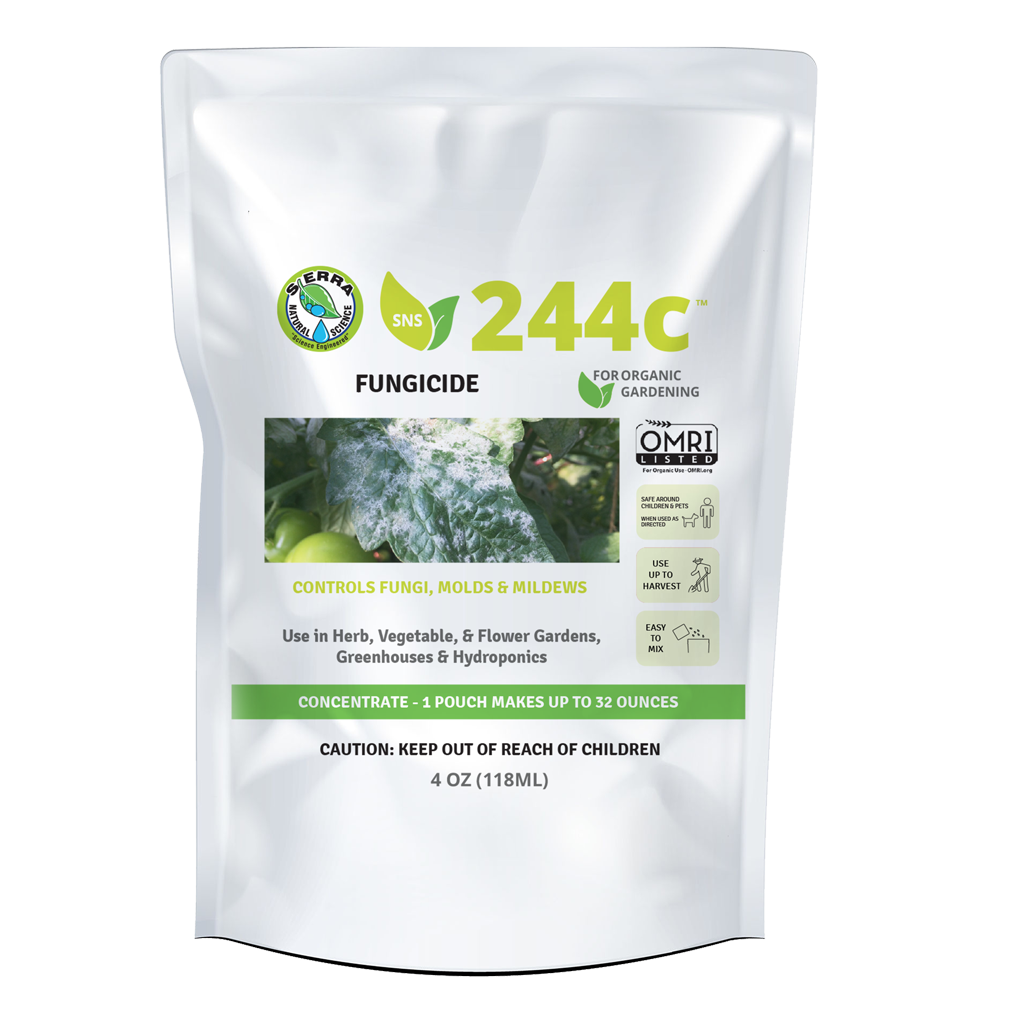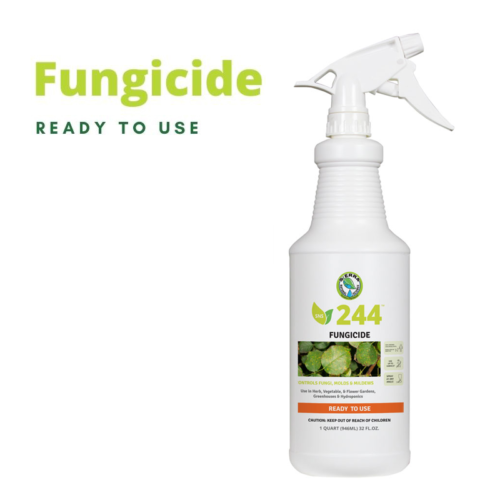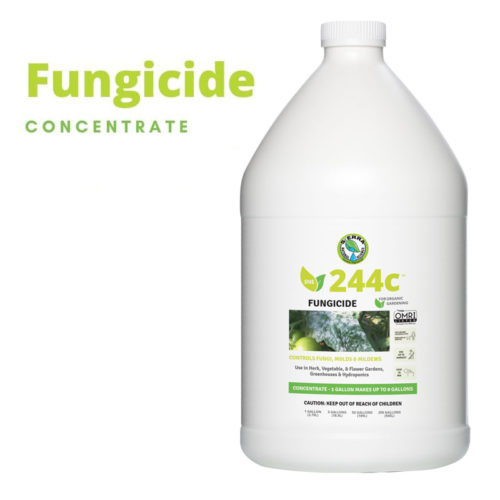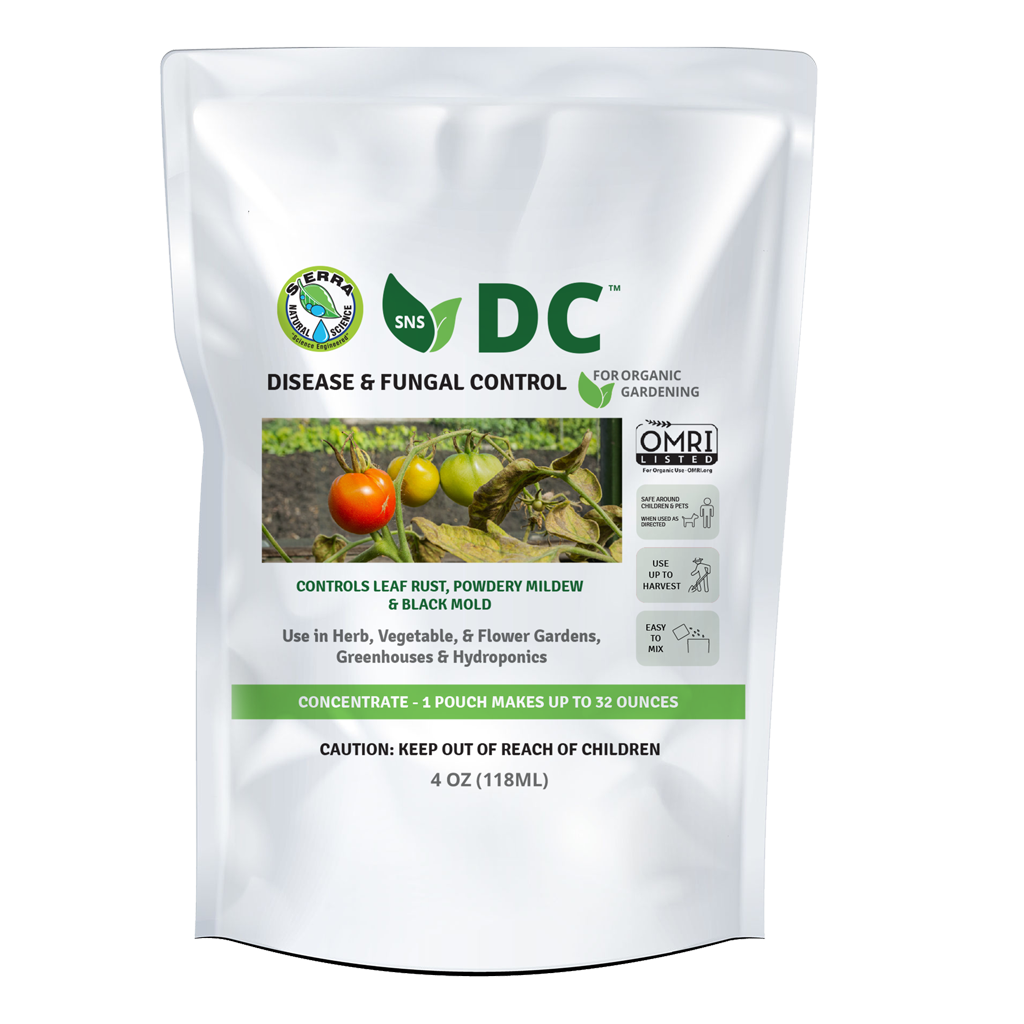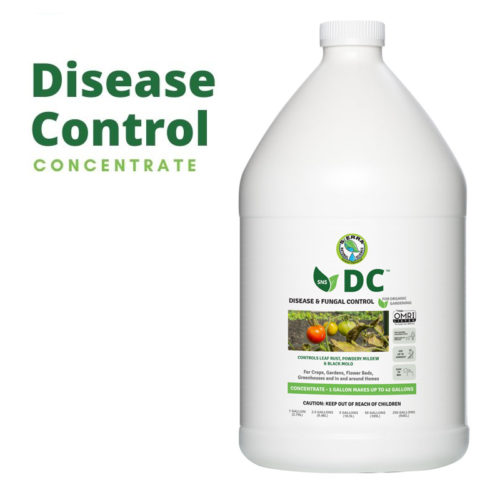OMRI Listed Fungicide and Disease Control Products
Sierra Natural Science offers two types of OMRI listed fungicides and disease control products to protect your plants from common molds, mildews, fungus and plant diseases.
✔ Made with Natural Botanicals
✔ Made in the USA
✔ Safe Around Children & Pets when used as directed

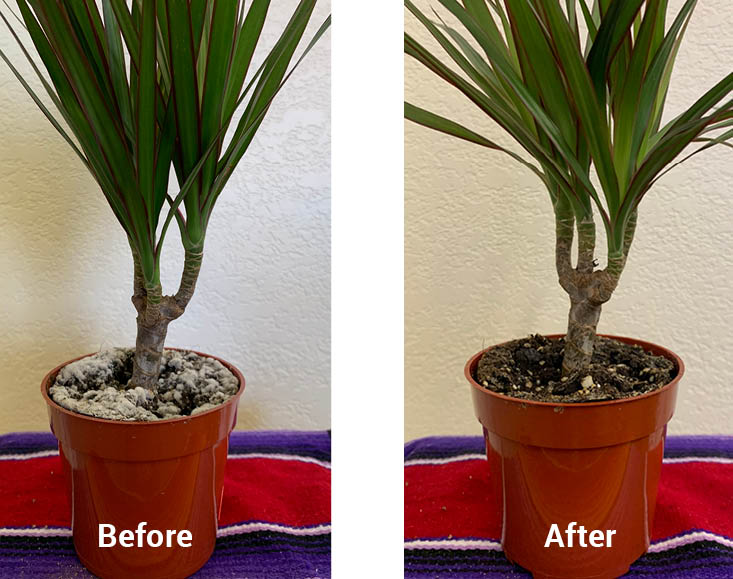
SNS Has Fungicides for Every Application
SNS 244 Fungicide
244C Natural Fungicide Pouch
850046870101244 Natural Fungicide RTU
244C Natural Fungicide
SNS DC Disease and Fungal Control
DC Disease & Fungal Pouch
850046870125ADC Disease & Fungal Control
Our Fungicides Are Effective On
Black Mold
Leaf Rust
Mildew
Fusarium
And 12 different kinds of Fungus and Disease!
Are you tired of fungus & mildew damaging crops?
Whether you’re cultivating a beautiful rose bush for competitions, growing a backyard garden, or harvesting crops at a commercial scale, plant fungus and disease can be disastrous.
So we made two solutions: SNS-244 & SNS-DC
Both solutions are:
✔ Made for home & garden
✔ Available in ready to use & concentrate
✔ Safe around children and pets when used as directed
✔ Available in bulk sizes
See our chart for advantages of each
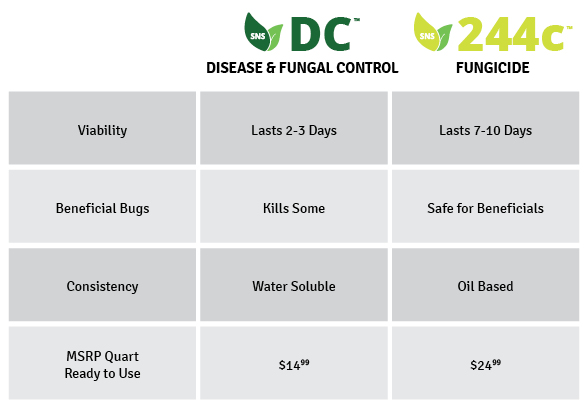
How to Use our Fungicides
1

Pick an evening, or turn off the lights
2
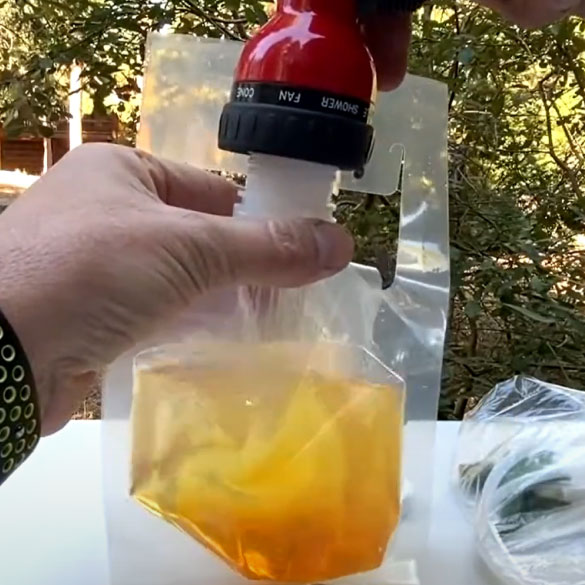
Mix with water
3

Spray leaves periodically
Find Out Which Natural Fungicide You Need
(video is about 1 minute)
Protect Your Plants With Piece of Mind
SNS 244 Fungicide
244C Natural Fungicide Pouch
850046870101244 Natural Fungicide RTU
244C Natural Fungicide
SNS DC Disease and Fungal Control
DC Disease & Fungal Pouch
850046870125ADC Disease & Fungal Control
Helpful Articles About Fungicides
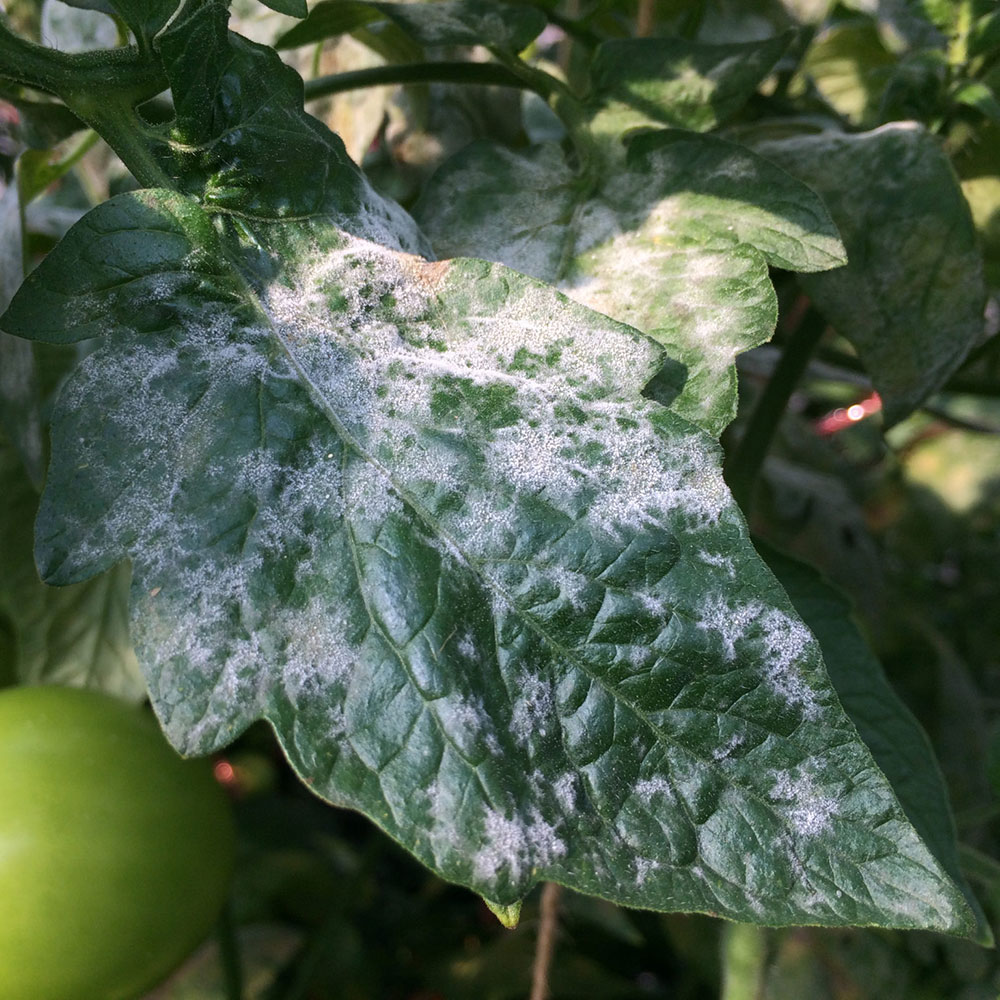
What is Powdery Mildew?
Plants are constantly exposed to the elements. Rainfall, irrigation, and sunlight all play a part in diseases and how to control them. Common diseases like powdery mildew may not kill your plant but can stunt growth. Powdery mildew is a white, fine covering that can show up on leaves
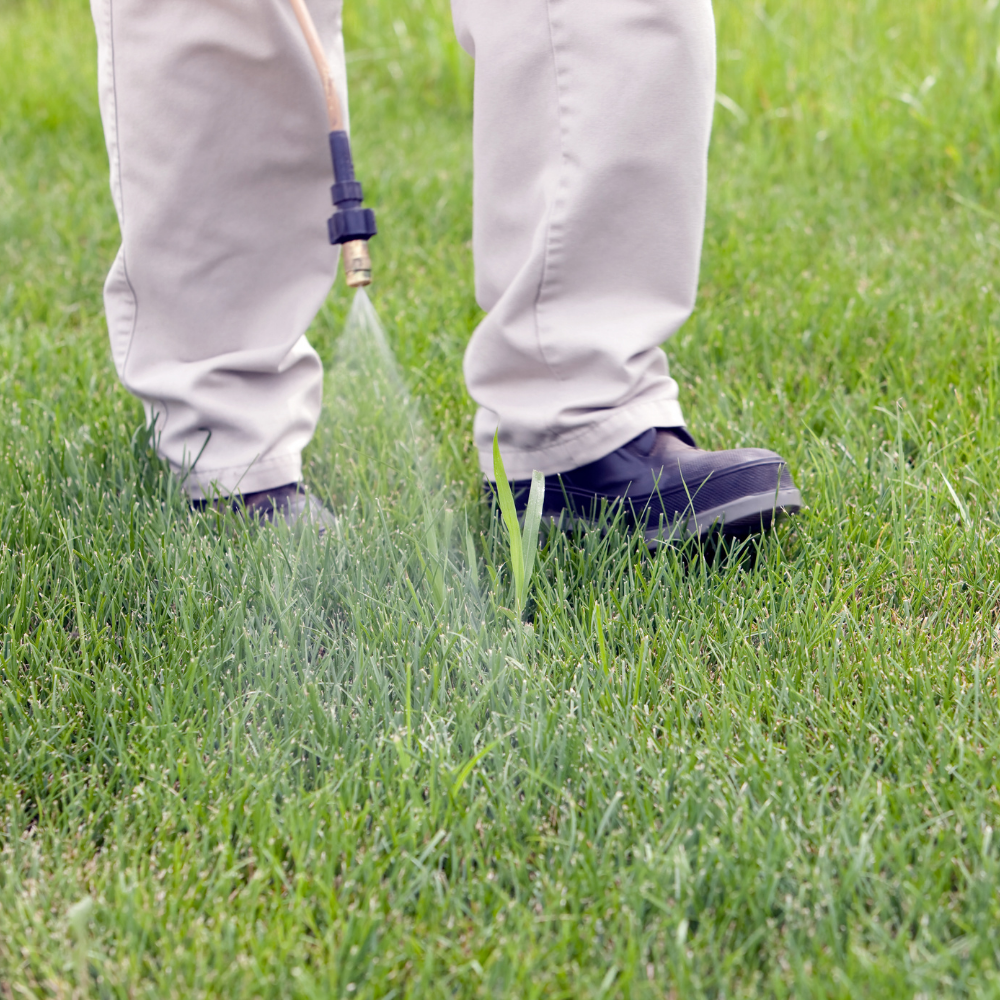
When to Apply Fungicide on Lawns
Lawn disease is something you notice right away. Not surprisingly, when your lawn turns yellow, red, or orange, there’s a reason to be alarmed. Fungicides are essential to maintaining healthy lawns. Despite the best maintenance practices, the lawn can unfortunately get various diseases. This
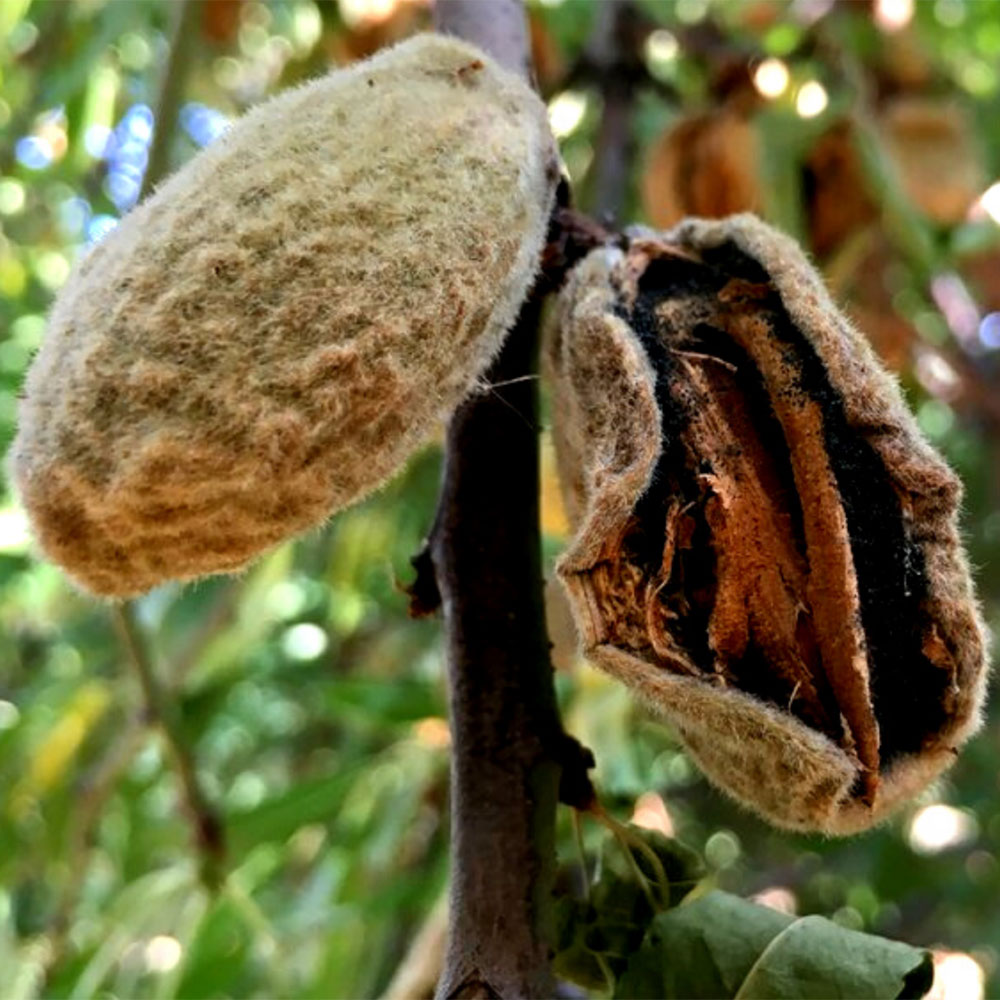
DC Fights Mold at Almond Ranch
Plants are constantly exposed to the elements. Rainfall, irrigation and sunlight all play a part in diseases and how to control them. Diseases can cause decay of the flower or fruit. In minor cases you can remove branches, but in major cases the whole tree is killed and must be removed to
Frequently Asked Questions
Here are some of the common questions we’re asked.
There are no stupid questions though – only information you don’t have yet – so ask whatever is on your mind.
What is your antifungal for plants made of?
Many of the first fungicides developed were inorganic compounds based on sulfur or metal ions such as copper, tin, cadmium, and mercury that are toxic to fungi. Copper and sulfur are still widely used today. Most other fungicides used today are organic compounds and thus contain carbon.
How does one make an organic fungicidal product?
Baking soda is a common household ingredient that can be used in a homemade formula. It can be mildly effective as a fungus preventative. Combine 1½ teaspoons of baking soda with a teaspoon of vegetable oil and a gallon of water. Spray to combat powdery mildew every five to ten days until the solution drips off the plants, and spray more frequently in rainy weather.
Is there a Home Made Recipe?
Mixing baking soda with water, add about four teaspoons or one heaping tablespoon, twenty ml to one gallon, four liters of water. Note: many resources recommend using potassium bicarbonate as a substitute for baking soda. Dishwashing soap, without degreaser or bleach, is a popular ingredient for homemade plant fungicide.
Is Vinegar fungicidal?
While this acidic liquid is sometimes recommended as a plant fungicide, spraying vinegar directly on plants is a bad idea since one may kill or damage the foliage. While some homemade fungicide recipes include a little vinegar, no scientific studies to date support the idea that vinegar alone kills plant fungi.
Is Neem oil a good option?
One can use neem oil to prevent or even kill fungus on their plants if they are comfortable with possible damage to the leaves and stem. Another downside to Neem oil is the oily residue it leaves on flowers, leaves and fruits. While the residue can be washed off of most fruits pretty easily, it can be impossible to wash off of flowers and leaves. Use neem oil for powdery mildew and other common fungal diseases, including black spots, at your own risk. You can get the best fungicide, which is safer and more effective right here on the SNS website.
Help Your Plants Grow
Organic
Fungicides are a specialized type of deterrent used to control and mitigate the fungi that cause fungal diseases. It’s essential to determine the cause of symptoms before deciding on the use of these products.
The main reasons for the use of SNS organic fungicide is to:
- Enhance seed productivity and reduce crop blemishes.
- Prolong shelf life and quality of produce harvested.
- Control disease during crop development.
- Make gardening and harvesting easier and better.
- Reasonable pricing with a price that is better than our competitors.
Our supplies help your plants and garden to grow much better than homemade solutions.
Botanical
In order to create botanical fungicides, some manufacturers extract components like sabadilla, pyrethrin, and rotenone from their respective plants. Botanical products are safer for the environment. They’re also much safer for people applying them compared to chemical pest control options like pesticides to a garden. They are often stronger and more effective than many natural or organic fungicides. SNS uses botanical fungicides in some of its antifungal for plants, including SNS 244C™ Concentrate, SNS-244™ Ready to Use, and SNS-DC™ All Natural Disease & Fungal Control Concentrated, among others.
The products of SNS are superior because of the unique combination of botanical extracts used in our proprietary formulas for gardens. Even though other companies may make organic fungicides, they are not necessarily botanical and not as good for your plants or garden. Our organic supplies are safe for crops and proven to work with growing your seeds and harvesting your garden.
Fungicidal Oils
Fungicidal oils minimize the spread of pathogens through:
- Control over the vectors that carry them e.g. aphids and mites.
- Control over thrips that, in turn, reduce the spread of the tobacco mosaic virus.
- Effective management of powdery mildew in your garden.
Many plant and garden varieties are delicate and sensitive to oils. In conifers, damage spans from the needle-like leaves, which are deprived of their somewhat blue color and caused to darken. In broadleaf plants, oil harm causes a light yellowing that later forms into water-splashed sores, darkening before eventually dying. This can make safe gardening difficult, which is why we seek to make it easier with our organic supplies.
Horticultural Oils
Horticultural oils are the garden products derived when refining mineral oils to repel pollutants that can harm plants. Final distillate oil becomes mixed with an emulsifying specialist that allows the oil to blend in with water. The two primary kinds of fungicidal oils utilized in the farm, garden, or lawn are:
- Summer oil – used on green tissue during the developing season for a garden.
- Dormant oil – utilized on woody fruit trees in their dormancy phases of growing.
High dampness can prevent quick oil dissipation, which can add to plant phytotoxicity. Sierra Natural Science offers a range of fungicide concentrates that are best suited for this gardening purpose because they have botanical extracts that will cause no or minimal damage to plants, crops and gardens. It’s recommended to apply the oil concentrate when the relative humidity is under 65% so the oil can dissipate rapidly. This is better for your gardens and plants.
Neem Oil
Neem oil is an extract from the neem tree. At an extract percentage of 70%, neem oil can somewhat kill the spores of powdery mildew, insect vectors, and the eggs of various creepy crawly bugs that may affect your garden. There are some significant downsides to neem oil for your garden as well, for example:
- It’s toxic to cats and dogs
- It causes vomiting and drowsiness when ingested by children
- It’s not very effective in controlling most fungus blooms
Bicarbonates
Sodium bicarbonate can be successful against plant garden infections when utilized with oil. Though botanical fungicides are always advisable due to their effectiveness, potassium bicarbonate and ammonium bicarbonate provide better disease control and plant wellbeing than sodium bicarbonates. These bicarbonates have an added advantage in that they give nitrogen and potassium, which are useful plant minerals four your garden and plants.
Sulfur based fungicides
Sulfur can be a preventive fungicide against mildew, rose dark spots, rusts, and different infections in gardens and plants. Sulfur keeps contagious spores from sprouting, so it must be applied before the infection spreads for the best outcome. Sulfur also has an unpleasant smell, and if enough is ingested, it can cause burning sensations or diarrhea.
Sulfur takes the form of wettable powder or fluid fungicide such as fungicide concentrate. One should try not to use sulfur if oil spray was used within the previous thirty days – the blend is phytotoxic to crops. Similarly, you shouldn’t apply any sulfur when temperatures can potentially exceed 80°F in order to lessen the danger of plant damage. Some crops happen to be very sensitive to sulfur, so keep that in mind. Lime-sulfur is a type of sulfur blended in with lime (calcium hydroxide) and is a calm but potent spray, which means it ought not to be applied to plant foliage. Lime-sulfur is more potent than regular sulfur at lower concentrations.
Copper
A fungicide made with copper can adequately kill fungi and microbes on some crops and gardens. Farmers should take care to keep copper from harming the host plant by using sparingly at low concentrations. Copper sulfate was among the earliest natural copper fungicides used.
Copper isn’t solely just fungicidal. The Bordeaux blend additionally is bactericidal, which implies that it can be effective against infections caused both by fungi and by bacteria. The Bordeaux blend owes some portion of its success to its capacity to continue through spring downpours and adhere to plant membranes. The so-called “Bordeaux Blend” has equal parts of copper sulfate and lime to about 50 parts of water. Copper, similar to sulfur, can be phytotoxic. Youthful foliage is particularly delicate when it comes to copper and your garden.
Companion Planting and Compost Teas
Companion Planting
Companion planting can help combat fungal infections and enrich soil structure as well. A good example is borage. Borage supports just about any plant close to it by limiting the harmful effects of pests and infections. It’s especially useful to strawberry plants and tomatoes. Another good companion plant is chives. Chives improve the development and flavor of vegetable yields and can reduce scabs in apple trees and dark spots in roses. Garlic plants also collect sulfur in the dirt, which is an appropriate fungicide that plants will assimilate into their pores when it’s nearby. If companion planting doesn’t work, it’s always advisable to go for botanical fungicides such as the products offered by SNS.
Compost Teas
Compost teas contain beneficial microbes and nutrients that can act as a light fungicide. They also mitigate against similar effects of vector-borne disease.
Directions to prepare home made compost tea:
- Add about five centimeters of finished compost into the bottom of a bucket
- Mix an ounce of unsulfured molasses to feed the beneficial microorganisms in the compost
- Fill the bucket to about six inches from the top of the bucket with water
- Let the mixture steep outdoors in the sunlight for two to three days
- Strain the compost from the tea with cheesecloth
- Spray the tea onto the plants and the soil about every two to three weeks
Compost teas contain helpful microorganisms and supplements that have properties of mild-acting fungicides, and compost teas also control different infections transmitted by bugs. The homemade remedy of compost, while inexpensive, is time consuming and less effective than the SNS fungicide products.
Is Cedar Apple Rust plaguing you?
Cedar apple rust is a rust disease, related to cedar hawthorn rust and cedar quince rust. These rusts require two hosts to complete their life cycle. In addition to the obvious eastern red cedar trees, these rust diseases affect junipers and other alternate hosts including apples and crabapples.
Symptoms of Cedar Apple Rust
Symptoms on Juniper Trees
Cedar apple rust shows symptoms of brown perennial galls on twigs, which will swell and produce orange telial horns with a gelatinous consistency during rainy weather. Cedar apple rust galls are usually over two inches in diameter.
Symptoms on Apple or Crabapple Trees
Apple and crabapple trees will develop circular yellow or orange spots on apple tree leaves, known as lesions, on their leaves after blooming. In late summer, you’ll see brown clusters of threads and cylindrical tubes called aecia under the spots on the leaves or fruits as well as twigs.
Solutions to Cedar Apple Rust
There are multiple ways to solve cedar apple rust issues, with varying levels of effectiveness.
Pruning
You can try to prune the galls from the trees, but this isn’t the most effective method due to the way spores travel along the wind.
Fungicidal Spray
A preventative fungicidal spray or fungicidal soap can be applied while the galls are orange and gelatinous, a window of several weeks.
Is Powdery Mildew Consuming Your Cucumbers?
Powdery mildew is a white, fine covering that can show up on leaves and stems. Infected areas can turn yellow or dark-colored, and dead foliage can slip off the stem. Mildew is brought about by high humidity, low light, and reduced movement of the surrounding air. Improving environmental conditions prevents the growth and spread of powdery mildew. In case one is concerned about their garden or plants, this is the procedure some amateur gardeners use:
- Examine the cucumber plant for the presence of dusty mildew. They’ll look like a patchwork of white spores here and there on the surfaces of the leaves and vines. Some infected foliage could turn darker, dry up, and fall off.
- Clean the edges of the secateurs with a cloth dabbed with rubbing alcohol to sterilize the blade of any hint of bacterial and mildew presence from the recently cut plants.
- Cut off the diseased foliage and vines of the cucumber plant and dispose of the cuttings far away from the growing environment. This ensures that the fungus spores are not blown back to the garden by the wind. Then clean both blades of the secateurs with rubbing alcohol and allow them to dry before storing them away.
- Combine a mixture of five parts water and one part of milk in a cleaned spray device.
- Make sure that the cucumbers get a lot of natural light. Spray the plant(s) with powdery mildew with the spray mix. In natural light, the milk becomes an organic fungicide agent, killing any dusty mildew present then allowing the plant to dry.
- Water from an overhead irrigation system, or manually with a garden hose, will wash the spores away from the plant’s surface and allow the plant to dry.
Are you using Lawn Fungicide?
While you might be focused on plant fungicide, it’s important to remember that you want to use fungicide for lawn as well. A common fungus that pops up in lawns are mushrooms, but ther are many other types of fungi that can damage your lawns, ruining all of your hard work.
Fungicidal treatments are the most effective way to protect your lawn’s health and keep it disease-free, so be sure to apply a grass fungicide to your lawn as a proactive protection.
Definition of Fungicide
Merriam Webster defines fungicide as “an agent that destroys fungi or inhibits their growth”
Key Takeaways
Whether you’re looking to nurture your green thumb or trying to be a more environmentally conscious farming operation, natural fungicides are the way to go. Sierra Natural Science has a range of organic fungicide concentrates and sprays to work with any soil state, humidity and other environmental conditions for your plants and gardens.
Contact us today at 877-626-5505 to get a quote or visit the top of the page to view our plant and garden fungicide.
Natural Fungicide Return to Top
Third Party Content Disclaimer
Some of the information on this Web page has been provided by external sources. The provision of Third Party Content is for general informational purposes only and does not constitute as a recommendation for alternatives.The Third Party Content provided on this web page is obtained from sources believed to be reliable. Sierra Natural Science is not responsible for the accuracy or reliability of the information supplied by the external sources, and no guarantees are made by Sierra Natural Science or the providers of the Third Party Content as to its accuracy, completeness, timeliness.


